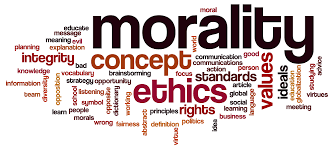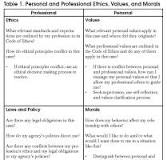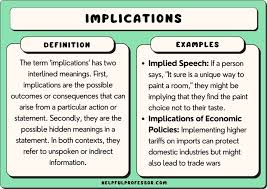The Concept of Moral: Exploring Ethics and Values
One of the fundamental aspects that define human behavior and interactions is the concept of moral. Moral principles serve as guidelines for individuals and societies to distinguish between right and wrong, good and bad, and ethical and unethical actions.
At its core, moral encompasses a set of values, beliefs, and principles that shape our decisions and behaviors. It influences how we treat others, make choices, and navigate complex ethical dilemmas. While moral standards can vary across cultures, religions, and philosophical traditions, the underlying goal remains universal: to promote well-being, justice, and harmony in society.
Ethical theories such as utilitarianism, deontology, virtue ethics, and consequentialism offer different perspectives on how to determine what is morally right or wrong. These frameworks help individuals evaluate the consequences of their actions, consider their duties and obligations, cultivate virtuous character traits, or focus on achieving the best outcomes for the greatest number of people.
Throughout history, moral philosophy has played a crucial role in shaping laws, social norms, and ethical codes. Philosophers like Aristotle, Immanuel Kant, John Stuart Mill, and Jean-Paul Sartre have delved into the complexities of moral reasoning and the nature of morality itself. Their insights continue to influence contemporary debates on topics such as human rights, environmental ethics, bioethics, business ethics, and political philosophy.
In everyday life, individuals often face moral dilemmas that require careful consideration of competing values and interests. From deciding whether to tell the truth in a difficult situation to choosing between personal gain and altruistic behavior, navigating moral challenges can be both demanding and rewarding.
Furthermore, institutions such as religious organizations, educational systems, legal systems,
non-profit organizations play a vital role in promoting moral values within communities. They
provide guidance,
support,
resources for individuals seeking to live ethically responsible lives.
In conclusion,
moral reflects our shared humanity
our capacity for empathy,
compassion,
fairness.
By cultivating a deeper understanding of moral principles
engaging in ethical reflection
we can contribute to a more just
compassionate society where respect for human dignity
integrity guides our actions.
8 Essential Tips for Living a Moral and Ethical Life
- Treat others with kindness and respect.
- Be honest and truthful in all your interactions.
- Take responsibility for your actions and their consequences.
- Show empathy and compassion towards those in need.
- Respect the rights and beliefs of others, even if they differ from your own.
- Avoid judging others unfairly or making assumptions about them.
- Practice forgiveness and let go of grudges to promote peace within yourself and with others.
- Strive to make ethical choices that align with your values and principles.
Treat others with kindness and respect.
It is essential to uphold the value of treating others with kindness and respect in all interactions. By showing empathy, compassion, and consideration towards others, we contribute to a more harmonious and understanding society. Respectful behavior fosters positive relationships, builds trust, and promotes a sense of community. Embracing kindness as a guiding principle not only benefits those around us but also reflects our own moral character and values.
Be honest and truthful in all your interactions.
Being honest and truthful in all your interactions is a cornerstone of moral integrity. When you prioritize honesty, you build trust, respect, and credibility in your relationships. By speaking the truth, even when it is difficult or uncomfortable, you demonstrate a commitment to transparency and authenticity. Honesty fosters genuine connections and promotes a culture of openness and accountability. Embracing this moral principle not only strengthens your character but also contributes to a more ethical and harmonious society where integrity is valued and upheld.
Take responsibility for your actions and their consequences.
Taking responsibility for your actions and their consequences is a cornerstone of moral behavior. It involves acknowledging the impact of your choices on yourself and others, whether positive or negative. By owning up to the outcomes of your actions, you demonstrate integrity, accountability, and a commitment to ethical conduct. This practice not only fosters personal growth and self-awareness but also contributes to building trust and respect in relationships and society as a whole. Embracing responsibility empowers individuals to learn from their mistakes, make amends when necessary, and strive to act in ways that align with their values and principles.
Show empathy and compassion towards those in need.
Showing empathy and compassion towards those in need is a fundamental aspect of moral behavior. By recognizing and understanding the emotions and struggles of others, we demonstrate our capacity for kindness and understanding. Empathy allows us to connect with people on a deeper level, fostering a sense of solidarity and support. Compassion, on the other hand, motivates us to take action to alleviate the suffering of others and offer help when needed. Together, empathy and compassion form the basis for building a more empathetic and caring society where individuals feel valued, understood, and supported in times of need.
Respect the rights and beliefs of others, even if they differ from your own.
Respecting the rights and beliefs of others, even when they differ from our own, is a fundamental aspect of moral behavior. It requires acknowledging the diversity of perspectives and values that exist in society and showing empathy towards those who hold different opinions or follow different paths. By honoring the autonomy and dignity of others, we contribute to a more inclusive and harmonious community where mutual understanding and tolerance prevail. Embracing this principle of respect not only fosters positive relationships but also upholds the core values of compassion, fairness, and human decency that underpin a morally conscious society.
Avoid judging others unfairly or making assumptions about them.
It is essential to uphold moral values by refraining from unfairly judging others or making unfounded assumptions about them. By practicing empathy, open-mindedness, and understanding, we can cultivate a more compassionate and respectful approach to interpersonal relationships. Each individual has a unique story, experiences, and perspectives that deserve consideration before passing judgment. Embracing a mindset of fairness and kindness not only promotes harmonious interactions but also fosters a sense of mutual respect and acceptance in our communities.
Practice forgiveness and let go of grudges to promote peace within yourself and with others.
Practicing forgiveness and releasing grudges are powerful acts that not only promote inner peace but also foster harmonious relationships with others. By letting go of resentment and anger, individuals can free themselves from the emotional burden of holding onto past grievances. Forgiveness allows for healing, growth, and the restoration of peace within oneself. Moreover, extending forgiveness to others can bridge divides, mend conflicts, and cultivate understanding and empathy. Embracing forgiveness as a moral practice can lead to a more compassionate and interconnected world where mutual respect and reconciliation prevail.
Strive to make ethical choices that align with your values and principles.
When faced with decisions, it is essential to strive to make ethical choices that align with your values and principles. By consciously considering how your actions reflect your deeply held beliefs, you can uphold integrity and authenticity in your behavior. Making decisions that resonate with your moral compass not only cultivates a sense of personal fulfillment but also contributes to a more ethical and harmonious environment for yourself and those around you.



